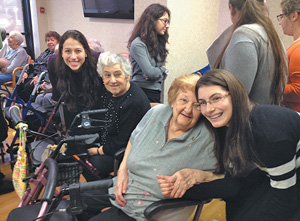
Last Friday, I had the honor of visiting the Miriam Apartments of the Daughters of Miriam nursing home in Passaic, New Jersey with my school, Bruriah High School for Girls. As head of the school’s chesed choir, I had the chance to sing various Chanukah songs and Hebrew melodies to the seniors with my fellow schoolmates.
Once we finished our performance, we had the opportunity to converse with the seniors there. I made my way around the room, making conversation with whoever was available. Most of our conversations revolved around their grandchildren and hobbies. I joined an elderly couple who were sitting together and quietly speaking. I always introduce myself as “Emmy,” but for some reason, my Hebrew name, “Shulamis,” slipped out of my mouth. “What a beautiful name,” the man commented. “My name is Akiva.” I turned to his wife, “What’s your name?” “Miriam,” she whispered.
Miriam had light blonde hair and wore a white blouse with a red sweater. Akiva had a full head of gray hair with a shirt and jacket to match. Akiva was born in Poland, and Miriam was born in Germany. After a short period of talking, they revealed that they were both survivors of the Holocaust. Miriam’s eyes filled with tears as she spoke of her childhood, and I instinctively reached for her hand. Miriam slowly became more emotional as she told me about the horrors of the Holocaust and the concentration camps she was forced into.
“They sent me to Bergen Belsen.” I looked into Miriam’s tear-filled eyes, and I too, began to tear up. “My grandmother, unfortunately, was also in Bergen Belsen.” While the room was bustling with much conversation between the 35 students and dozens of residents, somehow, it felt like just Miriam and I were in the room. In the somber silence that ensued between us, it was as if thousands of words were being exchanged. I inquired about Miriam’s family. “We have three kids, and we have grandchildren and great-grandchildren.” I looked at her with a sense of deep respect and awe. “You built a legacy. You and your husband rose from the ashes.” I then wished her much nachas from all her children and grandchildren. Miriam placed both her hands on my face as she slowly made her way to stroking the hair on my head. “Thank you,” she said through the tears. Miriam and I quickly wrapped up our conversation as we hugged and kissed.
When I looked into Miriam’s tear-filled eyes I didn’t just see a survivor, I saw a warrior, a modern-day Maccabee! We are a nation of warriors! After the recent Chanukah celebrations, I can’t help but acknowledge not only the miracle of Chanukah, but the miracle of Jewish survival throughout history. To quote Al Hanissim: “You delivered the mighty into the hands of the weak, the many into the hands of the few, the impure into the hands of the pure, the wicked into the hands of the righteous.”
The recent tragedies that have befallen our people might have caused us to lose faith and hope. Yet, upon examining our history, we are the only nation that has endured endless cycles of suffering and continuous survival. The longer we are in galus, the greater the miracles. We make up approximately 0.2% of the world’s population, and yet, we are one of the longest-surviving nations in the history of the world.
When we encounter struggles on an individual level or as a klal, we need to react properly and allow ourselves to grieve, but we must keep moving forward. Every member of klal yisroel has tremendous strength within. The proof lies in our ancestors. I never understood how it was possible for someone to experience hell on earth and still maintain a sense of belonging and perseverance. Incredibly, while spending time with the special seniors, it struck me. Our ancestors fought for the sake of living, but they also fought for truth. When adversity and struggle arise, we must always remember to keep fighting for the things worth fighting for–truth, our people, our identity, our religion, and our God.
By Emily Rosenblatt













